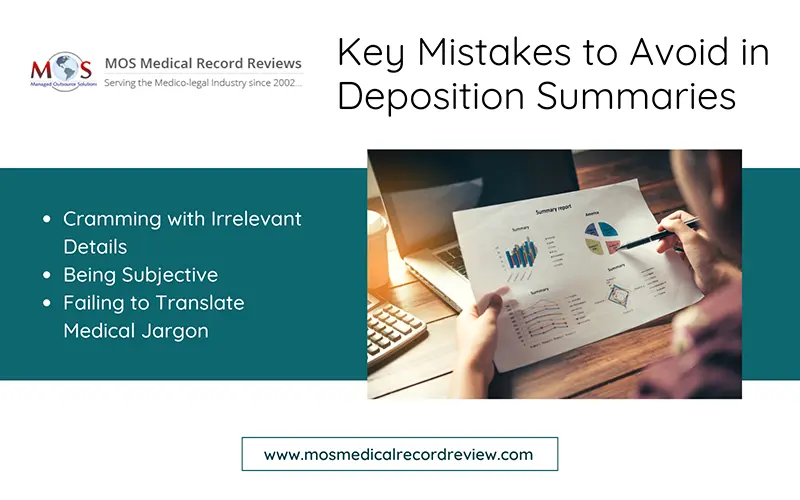When preparing for a trial, deposition summary plays a crucial role in formulating strategies for attorneys—especially those handling medical malpractice and personal injury cases—where healthcare providers become key witnesses. Usually, these cases involve multiple depositions wherein the attorney has to go through several dense & complex transcripts that drains his/her valuable time. A company providing medical record retrieval services can help you create an expertly written deposition summary that captures the essence of the testimony, and can significantly improve the attorney’s chance to turn the verdict in his/her favor. This blog will guide you in drafting a compelling deposition summary for attorneys.
Why Deposition Summaries Matter
Deposition Summaries save attorneys a lot of their time, otherwise having to sift through hours of recorded statements or pages of deposition transcripts and then condensing them into concise, accessible insights. Also, any person apart from a lawyer or a paralegal may not be able to comprehend the essential parts in the testimony to back up their claims, or otherwise. A properly drafted deposition summary enables attorneys to understand the critical points, identify discrepancies and present a rational case at court.
Key Sections of a Deposition Summary
1. Header
Add the details of involved parties like, date of the deposition, case name, name of the witness, docket number, and name of the summarizer. This contributes to quick identification and reference of the case.
2. Introduction
A summary of the purpose of the deposition, witness details and their relevance to the case. This will help provide a context, as attorneys will understand the expertise of the witness and their role in the case moving forward.
3. Summary of Key Testimonies
This is the most significant section of the summary. It should be organized in a way that lends the testimony a logical and topical structure:
- Expert Opinions: Detail the primary opinions and stands taken by the expert during the deposition. For instance, in medical malpractice cases, this can constitute the expert’s evaluation of the standard of care or particular medical conclusions.
- Supportive Evidence: Find strengths and weaknesses in the expert’s testimony. These can include references to medical procedures, guidelines or personal experience that can either strengthen or weaken the expert’s credibility.
- Medical Terminology: Ensure to detail out medical jargon and concepts as attorneys are not familiar with these specialized terms. They can lose their valuable time spending it on researching these terms so, simplifying them can make the summary ever so valuable.
- Areas of Disagreement: Identify areas where the expert’s testimony differs from other testimonies or evidence, as these contradictions could be brought up during cross-examinations, that could decide the outcome of the case.
4. Chronological Timeline
In cases like personal injury and criminal lawsuits, where events are crucial, a chronological summary helps attorneys visualize the events in a sequential order and identify any gaps in the testimony. Make sure the timeline is detailed and accurate, including dates and actions as described by the witness.
5. Q&A Format
For complex cases involving a lot of technical details, consider using Q&A format for critical sections. Emphasize key questions and answers that clarify complex points. Getting organized in this manner will help attorneys quickly grasp core information without the need to sift through the mountain of raw data.
6. Conclusions and Recommendations
Conclude by summarizing the overall impact of the deposition on the case, including any valid recommendations for attorneys preparing for trials. This can include pointing out gaps in the witness’ testimony that could help in refuting the opinion or any topics required for further investigation.
How to Craft a Deposition Summary
1. Detailed Transcript Review: Casually going through the transcript will not suffice. A detailed review will enable you to pick up key points, identify habitual patterns and terms specific to the field of expertise. Make sure to be thorough, as minor details can sway interpretation to either side.
2. Consistency: Follow a consistent pattern while summarizing, as it is critical for attorneys to find out the key information they are looking for, at a glance. Make use of tables and bullet points to enhance readability.
3. Break Down Complex Jargon: It is common for the summary to contain complex medical terms and technical language. Instead of this jargon, use simpler terms, which makes it easier for attorneys to understand the issue and present it promptly in court.
4. Be Objective, But Highlight Discrepancies: Maintain an objective tone throughout but highlight inconsistencies that you think may be influential for the case. For instance, a moment where the witness stumbles during deposition or a discrepancy regarding key information can turn out to be helpful for attorneys during trial.
5. Always Proofread: Accuracy is the cornerstone of any deposition summary. So, proofread the final document even though you may think you have reviewed it one too many times, during initial phases. Ensure names, dates and other details are correct as even small errors can prove to be fatal in high-stakes cases.
Things to Avoid While Drafting a Deposition Summary
1. Cramming with Irrelevant Details: Yes, every minute detail counts, but too much of it would dilute the effectiveness of the summary and make it a liability for the attorney. Stick to the facts and points that are actually relevant to the case.
2. Being Subjective: Stay away from making subjective comments about the witness or the testimony. It is inappropriate and at times, the judge would be able to pick it up, which could affect your case. Therefore, stick to presenting the summary objectively without letting personal feelings influence your narrative.
3. Failing to Translate Medical Jargon: Attorneys with non-medical backgrounds will have trouble translating complex medical terminologies and/or concepts, as opposed to healthcare providers. So, make sure to simplify these terms wherever possible.
Drafting an expert deposition summary takes skill, accuracy and an understanding of the legal process. A well-crafted deposition summary can be the difference between success and struggle, for attorneys handling medico-legal cases. By structuring the summary into sections, presenting a chronological timeline, simplifying complex medical jargon and keeping an objective tone throughout will make the summary very useful for attorneys to win the case.
It is common practice for law firms and attorneys to engage third-party, medical review companies that have a team of skilled paralegals and litigation experts to craft an effective deposition summary. MOS has the resources and skill set to create high-quality deposition summaries that include relevant facts and neatly organized for easy perusal and understanding.
Make Your Next Case Count
Transform complex depositions into a simplified and strategic document





